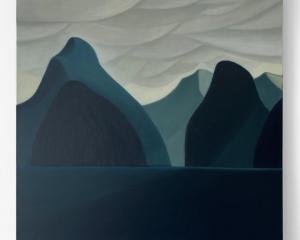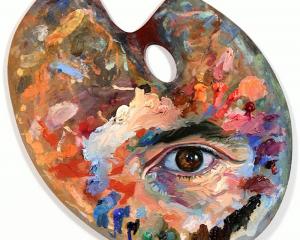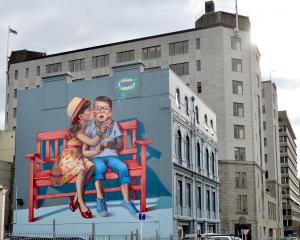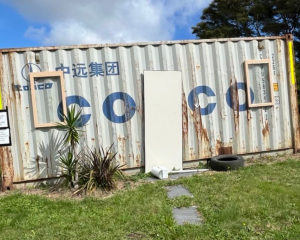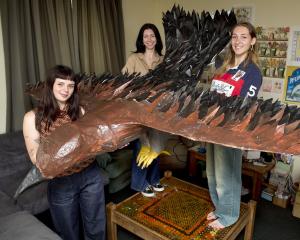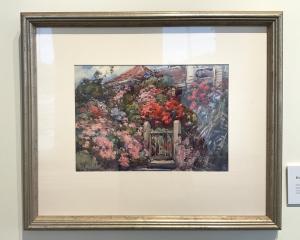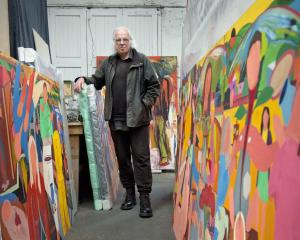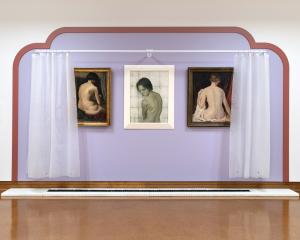Board games invoke childhood memories of family games of Monopoly or Scrabble — if you are old enough to remember the days before technology ruled. Dunedin artist Ruth Evans tells Rebecca Fox why she chose a board game for her master’s degree of fine arts project.

As a committed activist you would expect Ruth Evans to be championing the cause of the protester in her latest art project.
But no, she has taken on the persona of the capitalist, the mover and shaker in a board game of power.
Go Mine is Evans' major project for her master's degree of fine arts at Otago Polytechnic's School of Art.
The game features all the pieces of a traditional board game - a timer, dice, cards and buttons.
Evans has had a hand in creating all the pieces and designing the game itself, all with a point in mind - she wants to raise awareness of New Zealand's mineral extraction industries and how major corporations work.
''How can we call them out and expose them - fight back.''
She chose a board game after research showed a lot of artists had used games as a way of presenting conceptual ideas, such as Yoko Ono's white chess set (1966) aimed at exposing the futility of war.
Added to that, board games are enjoying a resurgence, she said.
''It's a more community way of engaging in gaming.''
Dan Jolin, of The Observer reported last year market research group NPD, which claims to measure around 70% of the United Kingdom toy trade, has recorded a 20% rise during the past year in the sales of tabletop games, while Ben Hogg, of United Kingdom distributor Esdevium Games, estimates that growth at closer to 35%.
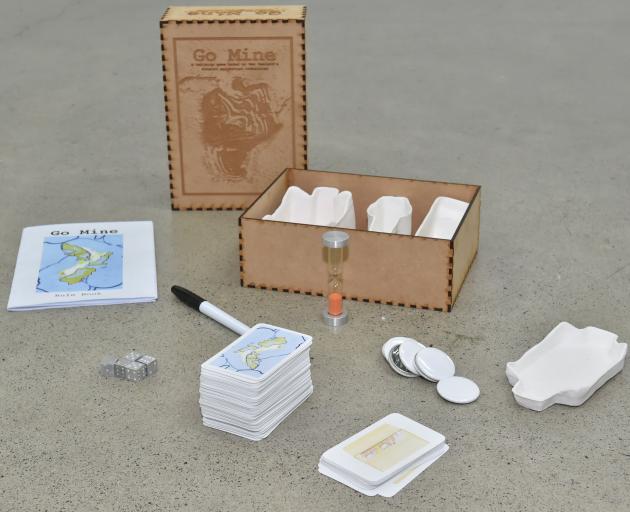
Evans, who was born in the UK and moved to New Zealand as a 7-year-old, has a history in activist organising.
Her parents were teachers and unionists, often taking her to pay parity protests in the 1990s.
It sparked an interest which saw her heading to antiwar rallies by herself in her early teens.
She found a home in the activism movement in Auckland, organising protests and other actions.
But when she became pregnant she decided she needed to concentrate her energies on her baby and gave up active organisation.
She, her partner and little boy then moved to Dunedin but she realised she needed another outlet for her creativity than the traditional protest movement.
''I learnt to play the accordion and my interest in art grew. I'd always been a maker.''
So she applied to Otago Polytechnic's School of Art bachelor of fine arts programme and she has continued through its honours and on to its master's courses.
Through the earlier programmes she concentrated on contemporary jewellery-making as a way to highlight consumerism and capitalism.
''For my master's, I intended making jewellery, but then I started to move away from that and a tabletop game seemed a really interesting outlet for creating a political art work.''
A few brainstorming sessions later and she came up with the concept for Go Mine highlighting New Zealand's mineral extraction industries.
It took a few test and dummy runs to get the mix right but in the end she came up with a concept that invites players to seek as much power as they can by buying up shipments of minerals.
Players take on the role of corporate tycoons and are faced with sudden decision-making which many people do not get to experience, she says.
''It really challenges you - it is a microcosm, a mirror of the way the system operates.''
There is also the option of bribing politicans, judges, the media, the navy or the Inland Revenue Department.
Players also get the chance to make up their own rules as they go along and rule out any they do not like through a ''conference call''. Those new ''rules'' have to be ratified reflecting the way treaties and trade deals are conducted in real life.
The choice to concentrate on the ''bad guys'' just seemed the right way to go.
''We all have the opportunity to be the good guys every day.''
But there is a catch - if they run out of resources everyone loses.
''It's a very cut-throat game that brings out the worst in people. It makes monopoly look like child's play.''
Having played the game many times with friends and family gave her a new perspective.
''I learnt interesting things about family and friends.''
The game itself has been made to reflect its topic with its dice made of aluminum by Evans - signifying the role of the Tiwai Aluminum Smelter and its energy consumption - and the card holders made from New Zealand's Matauri Bay clay, one of the whitest porcelains available and mined industrially.
Evans, with help from Jesse James-Pickery, constructed the box the game comes in and learnt how to laser cut the designs on the front and back.
She also wrote the rule book and designed the cards, which she then had printed.
As part of the project, she also
wrote 25 ''zines'' (small-scale, self-published work) on areas of concern around mineral extraction to demonstrate the research she had done into the historical, environmental and geopolitical implications of the industries.
She is also using her musical talent to reflect those issues and will perform at the game launch evening tomorrow along with other bands.
However, putting together the project had not been an individual pursuit.
''I'd not be here without the collaboration with others.''
She is now looking ahead to life outside art school. ''It's terrifying.''
Evans would like to sell her game so she could raise enough money to set up her own business in the ''real world'' and get back to jewellery making.
To see
Go Mine game launch, today 2pm-8pm and tomorrow 5pm-8pm, live bands and play the game, The Fitting Shop, Dunedin Gasworks Museum.



